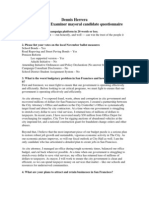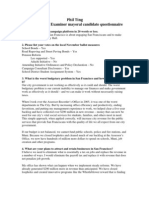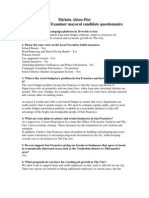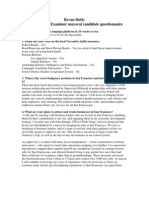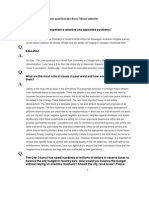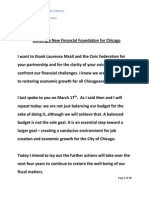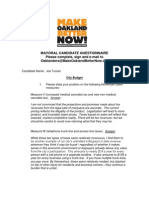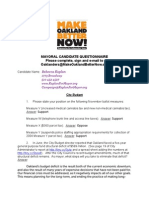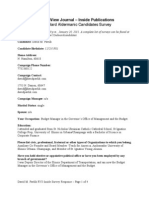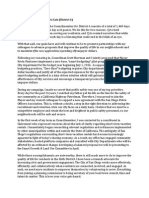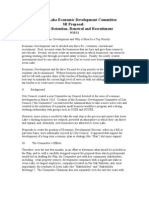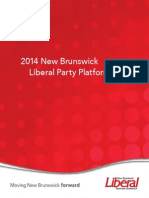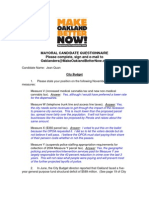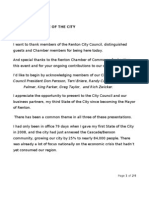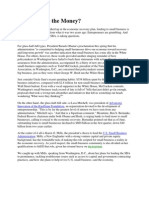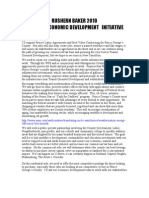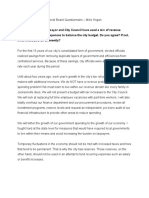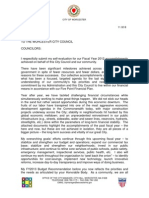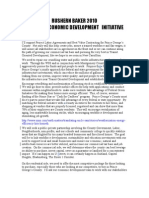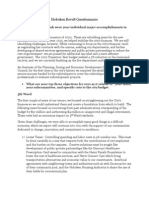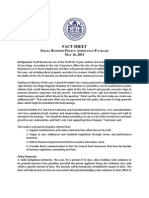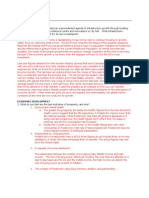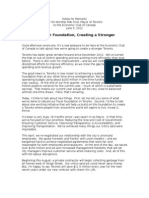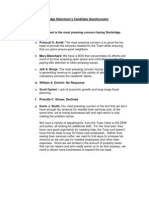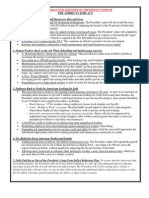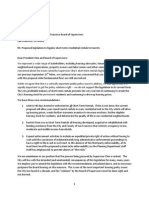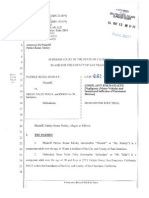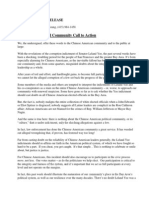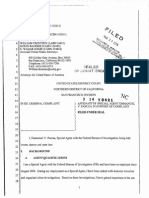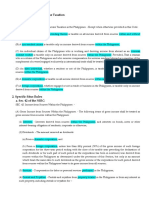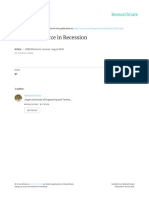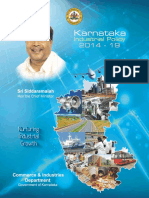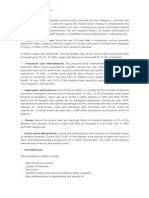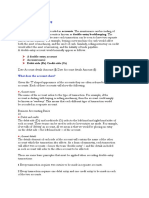David Chiu
David Chiu
Uploaded by
San Francisco ExaminerCopyright:
Available Formats
David Chiu
David Chiu
Uploaded by
San Francisco ExaminerOriginal Description:
Copyright
Available Formats
Share this document
Did you find this document useful?
Is this content inappropriate?
Copyright:
Available Formats
David Chiu
David Chiu
Uploaded by
San Francisco ExaminerCopyright:
Available Formats
David Chiu San Francisco Examiner mayoral candidate questionnaire
1. Please explain your campaign platform in 20 words or less. I will keep San Francisco moving in the right direction by bringing people together to get things done. 2. Please list your votes on the local November ballot measures School Bonds Yes Road Repaving and Street Paving Bonds Yes Pension Reform: Lee supported version Yes Adachi Initiative No Amending Initiative Ordinances and Policy Declaration Yes Campaign Consultant Disclosures Yes School District Student Assignment System No 3. What is the worst budgetary problem in San Francisco and how will you address it? Over the past decade, San Francisco has experienced significant structural budget deficits due to short-term budget planning. To address these long-term fiscal challenges, in 2009, I was proud to be the chief sponsor of Proposition A, a successful budget reform ballot measure that instituted long-term fiscal planning. Prop A now requires a two-year balanced budget requirement, five-year financial forecasting, and future, unexpected revenue surpluses to be saved until the next recession. Based on Prop A, San Franciscos first five-year financial plan released this year shows that revenue growth will be vastly outpaced by increasing costs, driven largely by growth in retiree pension and health care liabilities. This course is simply not sustainable, which is why I partnered with Mayor Ed Lee and labor leaders to develop the consensus pension reform measure that will be put to voters this fall. This measure will save The City up to $1 billion over the next 10 years all while preserving a dignified retirement for our workforce. Passage of this measure is one of the biggest steps we can take toward remedying our long-term budget problems, and I will be actively supporting and campaigning for it through the fall. If the measure fails, whether or not I am elected mayor, I will head right back to the negotiating table with these stakeholders to try to reach another deal that will achieve the goals we all agree on and can win the approval of the voters. This problem must be solved and cannot be put off any longer. 4. What are your plans to attract and retain businesses in San Francisco? As a mayoral candidate who founded and ran a business, creating jobs and retaining businesses as we transition out of the Great Recession will be my top priority. To reverse the trend of San Francisco becoming the bedroom community for Silicon Valley, we need to compete for the next online, biotech, and green technology companies and the jobs
that come with them by fostering innovation right here in our city. Thats why I helped to champion legislation that will keep Twitter in San Francisco, providing an anchor tenant for revitalized Mid-Market and Tenderloin neighborhoods. Its also why I worked to craft legislation to eliminate the stock options tax on start-ups that otherwise would leave San Francisco just as they are about to expand their workforces. We also need to do more to make it easier to start, build and grow small businesses in our city. As a supervisor, Ive eliminated dozens of fees nickling and diming local businesses - money thats better used to hire employees and increase productivity - but there is even more red tape to be cut. We should be providing incentives for businesses of all sizes to hire now, which is why I proudly support the JobsNow2 program that provides subsidies to employers who employ San Franciscans. And I believe that we should be looking at a tax system that doesnt penalize businesses small and large for creating jobs here in San Francisco, which is why I have been working for years on replacing our regressive payroll tax with a tax on gross receipts. 5. Do you support San Francisco giving tax breaks to businesses that agree to locate in economically distressed areas such as the Tenderloin district or Mid-market area? I am the only mayoral candidate who was a primary champion of the Central Market Payroll Tax Exclusion Zone and was proud to help secure its passage. This policy will keep one of the premier tech companies in the world headquartered San Francisco and attract businesses, small and large, to revitalize the neighborhoods that have been plagued by shuttered windows and chained doors for years. The Central Market Payroll Tax Exclusive Zone is extremely targeted, applying only to companies that create new net jobs, and according to our city economists projections, would benefit our citys general fund, by retaining direct tax revenue from companies that would otherwise leave San Francisco and attracting new businesses to the area. Any tax exemption programs I would support in the future would need to live up to similar standards: they must be targeted, address a strategic opportunity, be revenue neutral or positive, benefit the community, and be governed by appropriate oversight. 6. What proposals do you have for creating job growth in The City? Creating jobs and fostering economic development has been my top priority as a supervisor and will continue to be so as mayor. In the aftermath of the Great Recession, I have spoken to hundreds of workers struggling to hang on - unsure of where their next paycheck will come from, or if it will come at all. I want to protect the jobs of today while making sure the jobs of tomorrow are created right here in San Francisco. I am proud to have helped to bring billions of dollars in economic activity and thousands of jobs to the city through projects like the Hunters Point Shipyard, Parkmerced, Treasure Island, Central Subway and the Americas Cup, and to have sponsored several pieces of legislation to ensure that more of our citys business goes to local firms with local workers. So many of the other issues that we care
about health, safety, family security, education must rest on a foundation of economic stability. There are 6 broad strategies for job creation that I will employ: Create an Environment for Small Businesses to Flourish by consolidating fees and permitting processes, increasing the number of City contracts awarded to local small businesses, and increasing access to loan programs that enable businesses to expand. Support High-Growth Industries, not just in the technology sectors, but in artisanal manufacturing, social enterprise, and other industries that create opportunities for people without a college degree and who have barriers to employment. Ensure Access to Career Pathways For All San Franciscans by aggressively implementing and enforcing the local hire ordinance, strengthening partnerships between business and education institutions, and addressing barriers that prevent individuals from accessing workforce services and employment. Reform our Business Tax by replacing the payroll tax with a gross receipts tax that is more equitable and does not disincentivize hiring. Strengthen our Neighborhood Commercial Corridors by increasing investment in physical infrastructure (e.g., T-Third Street Muni line, parklets, streetscape improvements); highlighting and expanding local institutions; and expanding support for existing neighborhood economic development programs. Protect Workers from Abuse by strengthening our Office of Labor Standards Enforcement, and connecting employees with information about their rights and benefits.
7. Do you support San Franciscos policy of requiring contractors who bid on large public projects to guarantee that a significant percentage (at least 20%) of the work will be performed by city residents? Yes, I supported the percentage requirement for city contractors to hire local employees. As a Small Business Commissioner before I was elected to public office, I learned that most city contracts are awarded to non-San Francisco businesses and not to businesses that reflect our citys diversity. As supervisor, I have passed legislation to tilt the contracting playing field in some areas toward more diverse, local contractors. If elected mayor, I would support greater reform in The Citys contracting process to ensure that contracts are awarded appropriately. 8. Over the past decade, growth in the salary and benefits of city employees has forced the city to reduce services in a variety of areas. Are city employees overpaid? Are benefits too generous? If so, what can be done about this? I do think that in recent years, there has been a growth of middle and upper management throughout city government, and we need to make sure that our city government focuses on rank-and-file workers who are delivering basic city services. In some areas, our city
employees are paid disproportionately to their counterparts in our Bay Area counties, and we need to consider salary parity in such instances. Regarding pension and health care benefits, I certainly agree that we need to better control these looming liabilities, and thus worked for several months this year with Supervisor Sean Elsbernd, Mayor Ed Lee, business and labor leaders to develop a comprehensive, consensus pension reform measure that will be put to voters this fall. This measure will save The City up to $1 billion over the next 10 years all while preserving a dignified retirement for our workforce. As described in my answer to Question #3, passage of this measure is one of the biggest steps we can take toward remedying our long-term budget problems, and I will be actively supporting and campaigning for it through the fall. 9. The state could soon allow cities and counties to add more local taxes. What additional taxes, if any, would you propose for San Francisco? While we need to do everything we can to create jobs, since a growing economy will increase city revenues, we also need to look at new sources of revenue. The size of our recent budget deficits have meant that we should not only rely on service cuts to achieve budgetary balance. With Mayor Lee and many of my colleagues, I am supporting a halfcent sales tax for the ballot this November to replace the 1 cent rollback of the sales tax at the state level. The Board of Supervisors just unanimously decided to send this measure to the voters. For the November 2012 ballot, I support and have advocated for a reform of the business tax and a return to pre-2003 Vehicle License Fee levels. Both will likely be general taxes requiring majority approval. 10. What should be done to make Muni more efficient? What changes should be made to address the MTAs annual operating deficit? I do not own a car and often depend on Muni to get around The City, so I know first hand the challenges of late, crowded, and slow-moving buses, light-rail vehicles and cable cars. In the recent era of fare increases and reduced service, I have pushed successfully to restore Muni service cuts and crafted a reform package to require performance audits, explore governance challenges, and establish written work order agreements. That being said, Muni is not working as it should for San Francisco, and all San Franciscans know this all too well. Muni would absolutely be a priority for me as mayor, and I believe I would be more committed to a world-class transportation system than any mayor in recent history. Our beleaguered Muni system connects San Franciscans to jobs and schools, and public transportation is central to our economic development. When Muni fails, our city fails. The problems of funding are real for Muni. The recession saw revenues plummet for transportation agencies throughout the Bay Area. I support new revenue for the MTA and Muni, but the agency also has to get its management and labor houses in order. Over the past years, I have led the fight at the Board of Supervisors to ensure adequate Muni funding, and would continue to do so as mayor. I would also continue to be a leader in supporting a restoration of the Vehicle License Fee to the levels before Gov. Arnold
Schwarzenegger reversed the fee that had been in place for decades; this item alone could generate more than $50 million per year. Fortunately, San Francisco has a plan to improve Muni reliability and travel times: implementation of the MTAs Transit Effectiveness Project (TEP) would go a long way toward helping us fulfill our Charters Transit First mandate. We have a real opportunity to improving speed, reliability, and capacity on the Muni rapid network routes through downtown, as called out in the TEP. Unfortunately, the TEP has languished. I support accelerating the implementation of the recommendations in the TEP to achieve 10 to 30 percent time travel savings, dramatic operating cost savings and reliability increases on each line. Specific improvements would include bus stop consolidation, bus prioritization at traffic signals, proof of payment and ticket machines to speed boarding and permit all-door boarding on the busiest lines, and bus bulb-outs to reduce traffic delays and improve accessibility and passenger comfort. I support more transit-only lanes for rail and bus. Through the TEP, the MTA should develop a plan for converting light-rail and bus lines to low-floor vehicles to increase accessibility and speed boarding. The MTA must prioritize capital funding toward essential maintenance and capital improvements that enhance reliability, safety and access, including but not limited to shops and maintenance facilities, track and wires and electrical substations, train control and vehicle locators. 11. Homelessness still seems to be the foremost topic on the minds of voters. What's your plan to get people off the streets, especially when they refuse help? Unfortunately, our citys homeless debate often swings between the ideological pendulum of a law-and-order approach that criminalizes behavior associated with homelessness (sitting and lying on a sidewalk, public urination, aggressive panhandling), versus a liberally social approach of providing services to our homeless. The two sides rarely acknowledge how they can work in tandem. As a former criminal prosecutor who has seen the benefits of using a carrot-and-stick approach, I believe that law enforcement can work to properly incent a homeless person to take advantage of good social services, supportive housing, alcohol and drug treatment, job training, and mental health services. As a supporter of San Franciscos Community Justice Center and a former judgearbitrator of the Lower Polk community court, I would support the continued integration of these dual approaches. 12. In 2010, The City amended its Police Code to prohibit sitting or lying on a public sidewalk in San Francisco between 7 a.m. and 11 p.m., with certain exceptions. Do you support this policy? I did not support the sit-lie law because there are better approaches to the underlying issues targeted by the law, and because I did not think the law would make a significant impact on the quality of life in our neighborhoods. The lack of impact of the sit-lie ordinance has been anecdotally confirmed in recent months by feedback from residents throughout The City and in the press.
12. Do you support the Parkmerced and CMPC developments as currently proposed? I was the critical vote in favor of the Parkmerced development, which I voted for because it is the right decision for the resident tenants, for the larger neighborhood and for San Francisco as a whole. As part of the project, I made changes to address the concerns raised by some Parkmerced tenants, to ensure the right balance between protecting existing tenants while providing a tremendous opportunity to add much-needed housing and community improvements to the west side of The City. I support building a new hospital at Cathedral Hill, but it must be built the right way. I support the mayors efforts to negotiate a Development Agreement and efforts by community stakeholders to negotiate a Community Benefits Agreement. This model of community engagement proved successful with the Hunters Point Shipyard project and should be applied to CPMC. 13. Do you support increasing the number of permits to allow the conversion of rental properties into condos? As long as we also develop new affordable housing and increase our rental housing stock, I would consider a broader compromise on condo conversions that would help owners who have been waiting for the lottery for years. I would not support increasing condo conversions without broader policy solutions that address the lack of affordable housing and the diminishing rental housing stock in San Francisco. 14. Some people in San Francisco think that all tenants should be protected by rent control, regardless of the tenants income or wealth. Other people in San Francisco think that tenants should be protected by rent control only if they are lower or middle class, and cannot afford to pay market-level rents. What is your opinion on this issue? While means-testing for rent control sounds like a fair policy to help lower- or middleclass tenants, it would create the perverse incentives for landlords to hold out to rent to wealthier tenants rather than to rent to all tenants. I do not support undermining rent control which would push lower- and middle-class tenants out of San Francisco. 15. In 2009, San Francisco began turning over undocumented youths arrested for felonies to federal immigration authorities for possible deportation. The Board of Supervisors subsequently directed The City not to turn over undocumented youths unless they have been convicted of a felony, rather than simply arrested. What is your opinion on this issue? As a former criminal prosecutor who knows firsthand the importance of building trust between law enforcement and immigrant communities, I have been a strong supporter of San Franciscos status as a Sanctuary City, including ensuring the undocumented students are not deported without due process. I have always and consistently opposed using local law enforcement officials to enforce federal immigration law.
16. More than 5,000 children have left San Francisco over the last decade. What's your plan to keep families living in San Francisco? In addition to the disturbing trend of family flight, too often these days, I hear from San Franciscans who arent sure if they have a place in our city anymore. Families who have no choice but to move because they don't have access to good jobs, schools, childcare or parks. Tenants fighting evictions or homeowners fighting foreclosures. Whether it is day laborers from the Mission, African-Americans from the Bayview, Chinese seniors in public housing, or families in SROs living on less than $10,000 a year, if were going to succeed as a city, we need to make sure people of diverse backgrounds can live here. This will take much effort in many areas. First, we need to expand quality, accessible childcare, early education and elder care options for all families. I believe that city government can help provide adequate funding for childcare and help connect families with community-based organizations that provide these services. Second, we need to improve our public schools. We simply cannot tolerate schools that are failing our children, or continue to have families flee our city because of them. I assisted with the passage of the last school parcel tax, which increased teacher salaries and makes infrastructure improvements to San Franciscos schools. While the mayor does not directly manage the SF Unified School District, City College or SF State, I am committed to engaging teachers, parents and students in crafting my education priorities for San Francisco. I am proud to have received the endorsements of former Board of Education Presidents Norman Yee, Mark Sanchez and Eric Mar. Third, we need to invest more in open spaces and parks, as well as make neighborhoods more family friendly. I helped to pass the last bond measure to invest in our San Franciscos declining parks, and have worked to see that the monies are well-spent. As past chair of Lower Polk Neighbors, I have shown my deep commitment to making our neighborhoods cleaner and safer, a commitment that has continued in my work as Board President. Fourth, we need to focus on improving Muni. Many San Franciscans rely on Muni to get to work to support their families, and many children take the bus to school. We have to understand that a late bus is not just a late bus. A late bus means economic hazard for a parent - getting to work late generates uncertainty and heightens the potential for dismissal. Lastly, we need to build more affordable housing. As the past chair of the one of our citys largest affordable housing organizations, I have worked and will continue to work on increasing our citys affordable housing stock for years to come. 17. What are your plans to curb gang violence in The City? As a former criminal prosecutor and judge-arbitrator for a neighborhood community court, I know that public safety requires extensive collaboration between our police department, district attorney, court system, probation and social service programs that can
prevent crimes in the first place. No single strategy will solve the problems of gang violence, but there are several things we can do to make San Franciscans more secure. First, I believe strongly in community policing, and will make it a cornerstone of our citys public safety strategy as mayor. That means promoting formal and informal mechanisms for residents to collaborate with the police department, and supporting beat patrol officers to build effective relationships. Second, good data analysis is crucial to effective policing. The SFPD should continue to integrate the CompStat model into its everyday policing, and we need to implement our JUSTIS program to share data between law enforcement agencies, particularly concerning gang activity. Third, the SFPD must continue to implement ongoing reforms and modernization. Additionally, with many police officers retiring, we need trained professionals to replenish the ranks. In this years budget, I supported funding for a new Police Academy class because its critical for long-term public safety. Fourth, while gang injunctions can be one tool in law enforcements arsenal to curb gang violence, as the former president of the Youth Leadership Institute, I believe we must also invest in after-school programs, programs for at-risk youth, truancy programs, youth employment and other programs to address the root causes of youth violence.
You might also like
- Government Motion For Protective Order in Raymond "Shrimp Boy" Chow CaseDocument18 pagesGovernment Motion For Protective Order in Raymond "Shrimp Boy" Chow CaseSan Francisco ExaminerNo ratings yet
- Page0 29Document30 pagesPage0 29San Francisco ExaminerNo ratings yet
- Case Study EDUCATIONAL ASSISTANCEDocument2 pagesCase Study EDUCATIONAL ASSISTANCEShie Leyco - Amores100% (11)
- Dennis Herrera San Francisco Examiner Mayoral Candidate QuestionnaireDocument10 pagesDennis Herrera San Francisco Examiner Mayoral Candidate QuestionnaireSan Francisco ExaminerNo ratings yet
- Phil Ting San Francisco Examiner Mayoral Candidate QuestionnaireDocument6 pagesPhil Ting San Francisco Examiner Mayoral Candidate QuestionnaireSan Francisco ExaminerNo ratings yet
- Michela Alioto PierDocument4 pagesMichela Alioto PierSan Francisco ExaminerNo ratings yet
- Bevan Dufty San Francisco Examiner Mayoral Candidate QuestionnaireDocument9 pagesBevan Dufty San Francisco Examiner Mayoral Candidate QuestionnaireSan Francisco ExaminerNo ratings yet
- John AvalosDocument4 pagesJohn AvalosSan Francisco ExaminerNo ratings yet
- DC37 Questionnaire FINALDocument10 pagesDC37 Questionnaire FINALAzi Paybarah100% (1)
- Responses To Tribune QuestionnaireDocument7 pagesResponses To Tribune QuestionnaireharoldmmooreNo ratings yet
- 4.29 Finance Speech FinalDocument18 pages4.29 Finance Speech FinalCrains Chicago BusinessNo ratings yet
- Lightfoot Economic Development PolicyDocument8 pagesLightfoot Economic Development PolicyThe Daily Line100% (1)
- PAYP City Commission Candidate Questions CombinedDocument9 pagesPAYP City Commission Candidate Questions CombinedJeremy SalazarNo ratings yet
- Dilkens Inaugural Address 2014Document12 pagesDilkens Inaugural Address 2014windsorcityblog1No ratings yet
- Mayoral Candidate Questionnaire Please Complete, Sign and E-Mail ToDocument16 pagesMayoral Candidate Questionnaire Please Complete, Sign and E-Mail ToBruceNyeNo ratings yet
- Mayoral Candidate Questionnaire Please Complete, Sign and E-Mail ToDocument12 pagesMayoral Candidate Questionnaire Please Complete, Sign and E-Mail ToBruceNyeNo ratings yet
- L 009 GA Working - PGDocument1 pageL 009 GA Working - PGThe Florida Times-UnionNo ratings yet
- David Pavlik 32ndward RVJ-Inside QuestionnaireDocument4 pagesDavid Pavlik 32ndward RVJ-Inside QuestionnaireSamantha AbernethyNo ratings yet
- Gov. Dannel P. Malloy's Fiscal Year 2018-2019 Biennial BudgetDocument284 pagesGov. Dannel P. Malloy's Fiscal Year 2018-2019 Biennial BudgetNorwichBulletin.comNo ratings yet
- Combined Fy2017 Proposed BudgetDocument37 pagesCombined Fy2017 Proposed BudgetjfsotomartinezNo ratings yet
- July 2013 NewsletterDocument10 pagesJuly 2013 NewsletterRichard G. FimbresNo ratings yet
- 100 Days - Councilman Chris Cate (District 6)Document2 pages100 Days - Councilman Chris Cate (District 6)api-277474340No ratings yet
- Proposed Operating Book-FINAL PDFDocument539 pagesProposed Operating Book-FINAL PDFal_crespoNo ratings yet
- Republican Primary Republican Primary: Election Guide Election GuideDocument1 pageRepublican Primary Republican Primary: Election Guide Election Guideapi-207389937No ratings yet
- Emanuel Fiscal Reform AgendaDocument4 pagesEmanuel Fiscal Reform AgendaZoe GallandNo ratings yet
- Economic Development InitiativesDocument6 pagesEconomic Development InitiativesBryan WrotenNo ratings yet
- Erp 2014 IntroductionDocument24 pagesErp 2014 IntroductionMuhd AbrieNo ratings yet
- 2014 Liberal PlatformDocument44 pages2014 Liberal PlatformAndre FaustNo ratings yet
- Mayoral Candidate Questionnaire Please Complete, Sign and E-Mail ToDocument7 pagesMayoral Candidate Questionnaire Please Complete, Sign and E-Mail ToBruceNyeNo ratings yet
- 2010 State of The City 3-9-10Document24 pages2010 State of The City 3-9-10Dean RadfordNo ratings yet
- But Where Is The Money?: Advancing Innovation of The Kauffman FoundationDocument4 pagesBut Where Is The Money?: Advancing Innovation of The Kauffman FoundationJj VillafloresNo ratings yet
- GSSCC County Council Candidate QuestionnaireDocument2 pagesGSSCC County Council Candidate QuestionnaireDavid LublinNo ratings yet
- NhlanhlaNeneSpeechTax Indaba2018Document7 pagesNhlanhlaNeneSpeechTax Indaba2018Tiso Blackstar GroupNo ratings yet
- IVI-IPO Cochran-20 On 12-18-2014Document12 pagesIVI-IPO Cochran-20 On 12-18-2014aldertrackNo ratings yet
- Mayor 2021 Budget MessageDocument8 pagesMayor 2021 Budget MessageAnna MooreNo ratings yet
- Broom MetroNorthChamber ScreeningDocument5 pagesBroom MetroNorthChamber ScreeningAnonymous g1OvhvNo ratings yet
- Jobs PlanDocument3 pagesJobs Planjon_mummolo3075No ratings yet
- Mike Hogan QuestionnaireDocument5 pagesMike Hogan QuestionnaireThe Florida Times-UnionNo ratings yet
- Quante Wrightman EfestoDocument5 pagesQuante Wrightman EfestoMedia MediaNo ratings yet
- Budget Introduction FinalDocument3 pagesBudget Introduction FinalNBC MontanaNo ratings yet
- Fiscal Administration Rich SchoolDocument8 pagesFiscal Administration Rich Schoolrich22No ratings yet
- Worcester City Manager Michael V. O'Brien Self-Evaluation.Document24 pagesWorcester City Manager Michael V. O'Brien Self-Evaluation.MassLive.comNo ratings yet
- Rushern Baker 2010Document3 pagesRushern Baker 2010jon_mummolo3075No ratings yet
- Building San Diego'S Future: Small BusinessDocument11 pagesBuilding San Diego'S Future: Small Businessapi-140182856No ratings yet
- Hoboken Revolt Questionnaire 2011 - CunninghamlDocument4 pagesHoboken Revolt Questionnaire 2011 - CunninghamlDonnaAntonucciNo ratings yet
- UntitledDocument2 pagesUntitledapi-31316421No ratings yet
- VFP Candidate Questionnaire - 2019Document5 pagesVFP Candidate Questionnaire - 2019MichaelRomainNo ratings yet
- Questions That CountDocument4 pagesQuestions That CountJAFaust007No ratings yet
- 2010 Reforms Lansing Rotary 1-29-10Document8 pages2010 Reforms Lansing Rotary 1-29-10stcynicNo ratings yet
- Economic Club of Canada Address by Mayor Rob FordDocument6 pagesEconomic Club of Canada Address by Mayor Rob FordOpenFileTONo ratings yet
- Daniel J. Ursu For Richmond Heights MayorDocument2 pagesDaniel J. Ursu For Richmond Heights MayorThe News-HeraldNo ratings yet
- 5.25.23 Mayor Aftab Budget Transmittal LetterDocument3 pages5.25.23 Mayor Aftab Budget Transmittal LetterWVXU NewsNo ratings yet
- Governor Maggie Hassan's 2015 Budget AddressDocument16 pagesGovernor Maggie Hassan's 2015 Budget AddressRebecca LavoieNo ratings yet
- Farewell Address Remarks Release FINALDocument15 pagesFarewell Address Remarks Release FINALMartin AustermuhleNo ratings yet
- Senate Hearing, 111TH Congress - Financial Services and General Government Appropriations For Fiscal Year 2010Document63 pagesSenate Hearing, 111TH Congress - Financial Services and General Government Appropriations For Fiscal Year 2010Scribd Government DocsNo ratings yet
- Community Bulletin - April 2013Document9 pagesCommunity Bulletin - April 2013State Senator Liz KruegerNo ratings yet
- 01 Sturbridge Selectmen's Candidate QuestionnaireDocument25 pages01 Sturbridge Selectmen's Candidate Questionnairetrc100% (1)
- American Jobs Act: Fact SheetDocument6 pagesAmerican Jobs Act: Fact SheetAlbuquerque JournalNo ratings yet
- Game Plan For MississippiDocument9 pagesGame Plan For MississippibillyhewesNo ratings yet
- Middletown Mayoral Candidate Geen Thazhampallath Pledges and ScorecardDocument2 pagesMiddletown Mayoral Candidate Geen Thazhampallath Pledges and ScorecardCassandra DayNo ratings yet
- Tax Alpha Solutions: Effective Tax Management Strategies for High-Net-Worth InvestorsFrom EverandTax Alpha Solutions: Effective Tax Management Strategies for High-Net-Worth InvestorsNo ratings yet
- Government Opposition To Furminger Motion For Bail Pending AppealDocument16 pagesGovernment Opposition To Furminger Motion For Bail Pending AppealKQED NewsNo ratings yet
- SFMTA RE: BluegogoDocument2 pagesSFMTA RE: BluegogoSan Francisco ExaminerNo ratings yet
- AirbnbDocument54 pagesAirbnbSan Francisco ExaminerNo ratings yet
- Letter To Board of Supervisors Regarding Pending LegislationDocument2 pagesLetter To Board of Supervisors Regarding Pending LegislationSan Francisco ExaminerNo ratings yet
- Ryan Chamberlain LetterDocument3 pagesRyan Chamberlain LetterSan Francisco ExaminerNo ratings yet
- Joanne Hoeper Claim Against City Attorney's OfficeDocument7 pagesJoanne Hoeper Claim Against City Attorney's OfficeSan Francisco ExaminerNo ratings yet
- Jami Tillotson Complaint Against SFPDDocument6 pagesJami Tillotson Complaint Against SFPDmglocks100% (1)
- Nirav Tolia ComplaintDocument8 pagesNirav Tolia ComplaintSan Francisco ExaminerNo ratings yet
- SOS Initiative ReportDocument27 pagesSOS Initiative ReportSan Francisco ExaminerNo ratings yet
- Raymond "Shrimp Boy" Chow's Opposition To The Government's Protective OrderDocument80 pagesRaymond "Shrimp Boy" Chow's Opposition To The Government's Protective OrderSan Francisco ExaminerNo ratings yet
- An Open Letter and Community Call To ActionDocument3 pagesAn Open Letter and Community Call To ActionSan Francisco ExaminerNo ratings yet
- Long Term Bicycle Parking StrategyDocument86 pagesLong Term Bicycle Parking StrategySan Francisco ExaminerNo ratings yet
- A San Francisco Call Article About Ghee Kung Tong From 1898Document1 pageA San Francisco Call Article About Ghee Kung Tong From 1898San Francisco ExaminerNo ratings yet
- Commuter Shuttle PetitionDocument33 pagesCommuter Shuttle PetitionSan Francisco Examiner100% (1)
- Unsealed Yee AffidavitDocument137 pagesUnsealed Yee Affidavitjeremybwhite100% (1)
- Burning Man Lawsuit Response 2Document46 pagesBurning Man Lawsuit Response 2San Francisco ExaminerNo ratings yet
- Ballou 03Document18 pagesBallou 03brunomarinoneNo ratings yet
- IDT SaranshDocument204 pagesIDT Saranshconnectsujata1No ratings yet
- MGT 230 Final Exam MCQsDocument5 pagesMGT 230 Final Exam MCQsteacher.theacestudNo ratings yet
- Strategic Mamangement Project On Haleeb FoodsDocument83 pagesStrategic Mamangement Project On Haleeb Foodsmuhammad irfan73% (11)
- Idbi BankDocument16 pagesIdbi BankTamizh100% (1)
- Accounting For Depreciation Accounting For DepreciationDocument32 pagesAccounting For Depreciation Accounting For DepreciationKaranNo ratings yet
- 1-2021 FINMNN1 - 6 - WC and FD Problem Assessment: Bbcdbyes BaddbnoDocument2 pages1-2021 FINMNN1 - 6 - WC and FD Problem Assessment: Bbcdbyes BaddbnoMoreen VesquiraNo ratings yet
- Zero To Six Figures AmazonDocument14 pagesZero To Six Figures AmazonNelo AngeloNo ratings yet
- Tax Rev. Outline CompilationDocument23 pagesTax Rev. Outline CompilationMichael James Madrid MalinginNo ratings yet
- Moto g31Document1 pageMoto g31Shibu PraveenNo ratings yet
- PT Ramawijaya SportDocument29 pagesPT Ramawijaya SportDarDer DorNo ratings yet
- Human Resource During RecessionDocument30 pagesHuman Resource During RecessionHira Ejaz Ahmed ShaikhNo ratings yet
- Stock Statement Kunnel March-23Document5 pagesStock Statement Kunnel March-23Vinoop OkvNo ratings yet
- Karnataka Industrial Policy 2014Document107 pagesKarnataka Industrial Policy 2014Nikhil Suresh PareekNo ratings yet
- Chapter 1 Introduction To SCMDocument23 pagesChapter 1 Introduction To SCMEzry RizalNo ratings yet
- SUSTAINABLE TOURISM PPT 2Document21 pagesSUSTAINABLE TOURISM PPT 2Dianara Fernandez100% (1)
- Causes of Industrial DisputesDocument1 pageCauses of Industrial Disputesthilaga200950% (2)
- Seven Key Challenges in Assessing SME Credit Risk: WhitepaperDocument4 pagesSeven Key Challenges in Assessing SME Credit Risk: WhitepaperatiqNo ratings yet
- Unit 2: Designing The Supply Chain NetworkDocument69 pagesUnit 2: Designing The Supply Chain NetworkAkshatha ManjunathNo ratings yet
- BNL StoreDocument19 pagesBNL StoreAnshuman PandeyNo ratings yet
- Value Investing ReportDocument4 pagesValue Investing ReportPrincess Joy Andayan BorangNo ratings yet
- Economic Policy, Planning and Programming I (Ec311: BAEC-3 & BAED-3 2020/2021Document102 pagesEconomic Policy, Planning and Programming I (Ec311: BAEC-3 & BAED-3 2020/2021Hashim Said100% (1)
- AGREEMENT BETWEEN PARTIES Hipona Vs de GuzmanDocument2 pagesAGREEMENT BETWEEN PARTIES Hipona Vs de GuzmanJaime GonzalesNo ratings yet
- Chapter 5: Vouching: Intermediate (IPC) CourseDocument35 pagesChapter 5: Vouching: Intermediate (IPC) CoursevishnuvermaNo ratings yet
- Chapter 7: Business Contracts in Islam: 4PM-7PM FST-BK 6.3 Group 5Document23 pagesChapter 7: Business Contracts in Islam: 4PM-7PM FST-BK 6.3 Group 5iman zainuddinNo ratings yet
- M Finance 4th Edition Cornett Test Bank download pdfDocument51 pagesM Finance 4th Edition Cornett Test Bank download pdfdedexinauri100% (10)
- Devika Praveen - SIP Interim ReportDocument52 pagesDevika Praveen - SIP Interim ReportAdwitiya MistryNo ratings yet
- 5.1-Economics: Submitted by - Ayush Gaur SM0117012Document20 pages5.1-Economics: Submitted by - Ayush Gaur SM0117012Abhiveera 2018No ratings yet
- Double-Entry Bookkeeping: A Double-Entry Account Account Name Debit Side (DR) Credit Side (CR)Document5 pagesDouble-Entry Bookkeeping: A Double-Entry Account Account Name Debit Side (DR) Credit Side (CR)Veronica BaileyNo ratings yet



